#Melania Birther Trump
Text

I really don't care, do you?
Not even a little.
Tre45on
#When they show you who they are#believe them#Tre45on#Melania Birther Trump#Melania fashion#Melania style#Traitor Trump#Melania Trump fashion#Melania Trump style#donald trump#tre45on trump#lock him up#MAGA Republicans
2 notes
·
View notes
Text
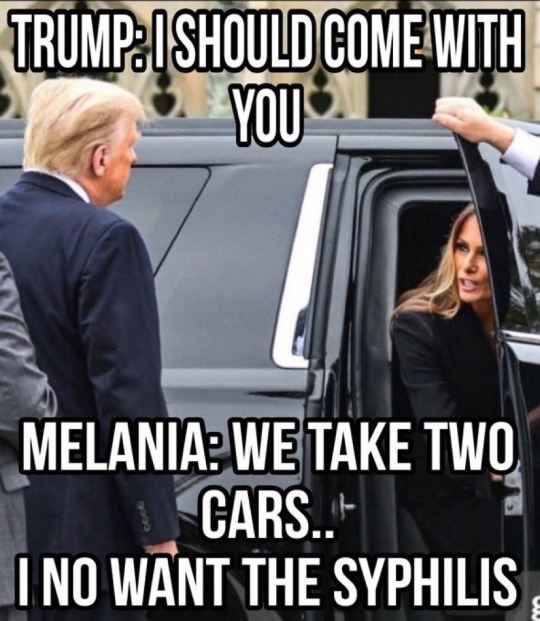
#melanie trump#melanoma#republican assholes#melania tramp#racist birther#Trump enabler#Christmas hating Nazi bitch#traitor trump#crooked donald#never Trump#Smelvis#political humor#resist#maga morons
31 notes
·
View notes
Text
In the wake of yet another round of legal troubles for former President Donald Trump, after a New York state judge determined this week that he committed fraud by substantially exaggerating his wealth for business dealings, Melania is reportedly taking precautions. Page Six reports that the former first lady has renegotiated her marital prenup with Trump to protect the financial interests of her son, 17-year-old, 6’7” Barron, as her husband’s legal troubles and bills pile up. Per the tabloid’s source, this is “at least the third time” Melania has renegotiated her prenup with the former president.“Melania is most concerned about maintaining and increasing a substantial trust for their son, Barron,” a source said, as she hoped to secure “a specific amount at minimum” for the very tall teen. Sources specified that Melania wanted the prenup to get her more money and property as well, and that a new “agreement was necessary because of the current legal battles” and the strain they put on Trump’s wealth.Read moreThroughout Trump’s political career, Melania has surprisingly been on the receiving end of a good amount of liberal sympathy. But let’s not forget that, according to numerous reports, she’s been an active supporter of Trump’s presidency, and, among other wretched political views, has endorsed racist birther conspiracy theories about former President Obama.The former first lady may be indifferent to the plight of migrant children separated from their parents (she really doesn’t care, Do U???), but she is apparently nothing if not protective of her own Very Large teenage son—certainly his financial standing. And her financial standing, too, of course!More from JezebelSign up for Jezebel's Newsletter. For the latest news, Facebook, Twitter and Instagram.Click here to read the full article.
0 notes
Photo

(via)
#media bias#melania trump#mlop#racism#xenophobia#birtherism#rnc#rnc 2020#rnc2020#republican national convention 2020#republican national convention#Trump administration
4 notes
·
View notes
Link
Well ... I guess she’d know the most about it ... after all, didn’t her husband purchase all his wives?
2 notes
·
View notes
Text
um, the bitch is a birther so...
i don’t really care, do you?
be careful of op-eds. it’s fuckwits like this that legitimized the fat orange wannabe dictator and inured people to his idiocy.
0 notes
Text
Melania Trump Posts Juneteenth Tweet And Gets Dragged For 'Birther' Past
Melania Trump Posts Juneteenth Tweet And Gets Dragged For ‘Birther’ Past

Melania Trump attempted to honor Juneteenth on Friday by reading a children’s book about the holiday — but was accused of not reading the room.
The first lady took to Twitter to read “All Different Now” by Angela Johnson, which tells the story of Juneteenth, a day that celebrates the end of slavery, through the eyes of a young girl.
In the tweet, Trump also reminisced about a trip to Ghana…
View On WordPress
0 notes
Photo
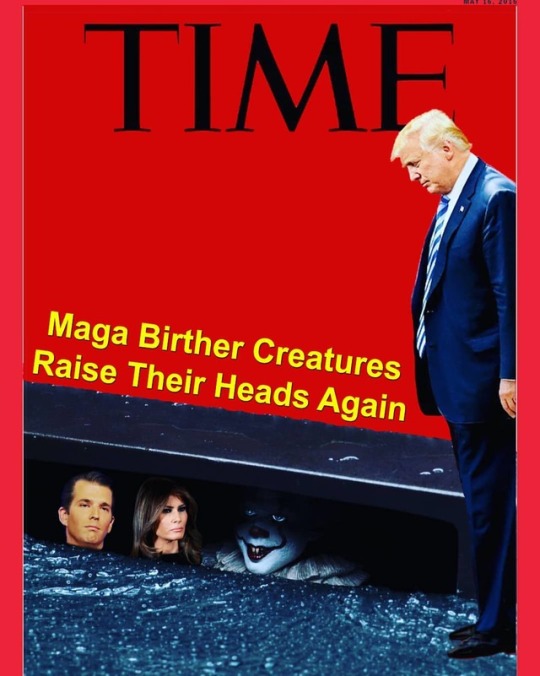
Trump's Birther Movement... Racist, Obstruction, Fraud & Con Man. #trump #donaldtrumpjr #putinspuppet #birther #america #news #global #instagramphoto #politics #melania #democrat #donthecon #republican #trumptrain #usa #world #worldstar #mueller #stoptrump #resist #people #instagram #liberal #it #maga #election2020 #racism #nevertrump #magaisformorons #marketing (at New York, New York) https://www.instagram.com/p/BzX6ixpgG6Y/?igshid=vmkhpaz4z9ep
#trump#donaldtrumpjr#putinspuppet#birther#america#news#global#instagramphoto#politics#melania#democrat#donthecon#republican#trumptrain#usa#world#worldstar#mueller#stoptrump#resist#people#instagram#liberal#it#maga#election2020#racism#nevertrump#magaisformorons#marketing
0 notes
Note
Allow me to apologize. I worded that wrong. I no longer support Donald Trump after that riot on the capitol. It was bad, it was violent, and it spits in the face of everything the GOP stands for. What I mean is that prior to that riot, I did not notice anything racist/homophobic about him, and I never understood why so many ppl have those allegations.
I accept your apology, and I’m glad at least that you don’t count yourself among the members of the Republican Party who have flagrantly turned their backs on what our republic supposedly stands for.
That being said, I’m afraid Donald Trump’s racism is still pretty hard to deny, and I have to admit, I’m both stunned and dismayed that you have somehow yet to see it.
As I said in my response to your original words, Donald Trump has long been championed by white supremacists like ex-KKK Grand Wizard David Duke and the Proud Boys, and he has consistently refused to actively condemn their actions or beliefs, instead being prone to jump into “what-about-ism” and “both-sides-ing” the issue so that he equates actively racist extremists with counter-protestors and civil rights activists...or, even worse, actively encouraging those racist extremists. (“Stand back and stand by,” anyone?)
This isn’t even touching on how Trump’s travel ban actively targeted Middle-Eastern countries and how even now there are dozens of Mexican and South American people locked up on our southern border in real-life concentration camps, separated from their families in the midst of a raging pandemic, all because of the rhetoric Trump spewed about Mexicans “bringing crime and drugs” into our country and “being rapists” who would “steal jobs” from “real” Americans. Regardless of one’s stance on immigration, refugees are protected under international law, and yet we have lumped them in with people who tried to cross our southern border illegally -- and on top of that, all of those people came to our country out of desperation, and most illegal immigrants who make it across the border and integrate into American society don’t become criminals at all. If anything, it’s more logical for them to try to stay under the radar, since they don’t want to be deported back where they came from! And even if you arrested those immigrants on the border as criminals, they would still be entitled to a full criminal trial and humane conditions while imprisoned, which they most certainly are not in at present. Trump got elected largely because of his anti-immigrant (which in truth was largely anti-Mexican and anti-Muslim -- he sure as Hell didn’t mind giving his wife Melania’s parents American citizenship without much fuss) rhetoric and his promise to “protect” America with a great big wall that Mexico would pay for -- a wall that, may I point out, we Americans not only paid for, but is also a tiny, pathetic shadow of what he claimed it would be and yet he’s still boasting was a victory of his administration.
Then of course there’s Trump’s history of racism toward black people, shown in his discriminatory housing practices and the completely fabricated “birtherism” conspiracy theory he started about Barack Obama that claimed he wasn’t a real American citizen, which tapped into a lot of racist Americans’ prejudice toward our first black president. Trump’s referred to countries like Haiti as “sh*thole countries” and blames China singularly for the spread of Covid-19 by trying to call it the “China Virus” and the “Kung Flu,” completely ignoring how much his own administration’s negligence resulted in America easily surpassing every other country on Earth in Covid deaths, with over 386,000 deaths in less than a year, compared to about 405,000 deaths over the course of four years during World War II. Even Trump’s whole mantra of “America First” is a slogan associated with both the Ku Klux Klan and the American Nazi Party -- David Duke himself used that very phrase when running for office in 2016, the same year Trump was elected president. I’m truly sorry, but if all of this doesn’t make it very clear where Trump stands in regards to race, I don’t think there’s anything I could do or say to make it clearer.
As for homophobia, I’d point to Trump’s supposedly more “religious” counterpart Mike Pence as being the more actively and vocally anti-LGBT out of the two of them, considering his support for “gay conversion therapy,” his voting history against gay marriage, his vote to preserve the Don’t Ask Don’t Tell policy, and his stance on so-called “Religious Freedom” that denies services to people based on their sexual orientation or gender identity. But considering Trump selected Pence as his running mate, I think that says plenty about how unproblematic Pence’s anti-LGBT positions are to him.
Although I’m disheartened by the fact that I had to write out any of this and that you could have any doubt in your mind about the kind of person Donald Trump truly is, I’m at least encouraged that you’ve softened your words to the point that you acknowledge you don’t understand the other side’s position, as opposed to acting like other people are just being overly sensitive and confidently saying that one can’t name three instances where Trump has proven himself to be racist.
#ask me#excuse me politics coming through#donald trump#mike pence#racism#homophobia#I'm honestly kind of stunned you feel any need to defend this man at all though?#I mean even if he's despicable for more reasons than just his treason#why do you feel the urge to try to say 'well he's not as racist as people say he is?'#it kind of feels like those people who try to claim that at least hitler was a good artist#which honestly?? ehhhhh not really??
9 notes
·
View notes
Link
Despite appropriating the grandiosity of the White House for his own political gain, Trump still fell solidly short of Joe Biden’s 24.6 million viewers. And on the third night of the convention, Kamala Harris at 22.8 million viewers trounced Mike Pence, who delivered a dismal 17.3 million viewers.
But even before we had that metric to judge by, GOP convention organizers sought to make the case for Trump mostly in his absence. Even though Trump bookended the 4-day liefest by showing up early on the first day and blathering away for nearly an hour, and then closing out the convention by blathering for more than another hour, Trump was surprisingly more absent than expected in between those two appearances.
In Trump’s absence, his validators worked really hard to sell Americans on some mythical Trump figure who’s really a nice guy deep down, not racist, and much more mainstream than the cringe-worthy Trump we’re all subjected to on a daily/hourly and sometimes minute-by-minute basis.
“From the day that I met him, he has only wanted to make this country the best it can be,” first lady Melania Trump said in her Rose Garden speech Tuesday. “America is in his heart.” Of course, she also said Americans deserve “total honesty” from their president and Trump’s guy to give it—so let’s just say Melania’s more of a grain-of-salt validator.
But the Trump-less mirage was the plan—placing fictional warm-and-fuzzy Trump in a fictional world where he never bungled the coronavirus cuz it never happened and the Biden-Harris ticket is actively planning to destroy the suburbs as white America knows them.
The problem for the Trump campaign moving forward is that fictional Trump doesn’t exist and everyone damn well knows it because his main mission in life is bringing as much misery to the world as he experiences in his own miserably decrepit brain. Additionally, the fictional world in which Joe Biden is an antifa puppet and the coronavirus isn’t claiming hundreds of thousands of American lives also doesn’t exist and every voter who could swing this election also knows that.
We’re not talking about the 30%-35% of Trump cultists who appear to have prematurely donated their brains to science. We’re talking about a segment of white female Trump 2016 voters, mostly with a college education, who ditched Republicans for Democrats in the midterms and, without whom, Trump doesn’t have a glimmer of hope of being reelected.
Now, it’s possible that the Democratic base and Black voters in particular will show up in numbers that completely swamp Trump no matter whom he persuades to vote for him. But the fact remains that without winning back these “soft Trump” voters, the Dons stands no chance whatsoever.
And in their world, the coronavirus exists as do the protests and the chaos in the streets of Kenosha, Wisconsin, and they are worried about both to varying degrees. Of those two concerns, Trump has lost the pandemic battle and ceded the issue. We’ve seen the polling, it hasn’t wavered, and Trump did absolutely nothing during the convention to reassure swing voters that he would miraculously start demonstrating some kind of leadership on the issue.
What’s left to him and his Republican allies is to convince these voters that what is happening in Kenosha could happen anywhere and is a bigger threat to them than the pandemic.
“What we can never have in America – and must never allow – is MOB RULE,” said Trump’s prepared remarks for his acceptance speech (emphasis theirs). “In the strongest possible terms, the Republican Party condemns the rioting, looting, arson and violence we have seen in Democrat-run cities like Kenosha, Minneapolis, Portland, Chicago, and New York.”
At a New Hampshire rally on Friday night, Trump followed up, telling the crowd, “We are all that stand between the American people and the left-wing mob.”
So far, the people wounded in Kenosha include: a 29-year-old Black man, Jacob Blake, who was shot in the back seven times by police, point blank; and three peaceful BLM protesters—two of whom died—shot by an armed Trump enthusiast. The violence isn’t coming from the protesters. It’s a product of the fury and division Trump has fueled from the moment he launched his political rise on the back of the racist birther movement seeking to delegitimize Barack Obama’s presidency.
Republicans, in an act of total desperation, are going to pour gasoline on the fire Trump has ignited to detract attention away from the roughly one thousand Americans who continue to die each day due to Trump’s COVID incompetence. During Mike Pence’s convention speech, he despicably suggested a federal officer, Dave Patrick Underwood, was killed by protesters in Oakland, California, when Underwood was actually executed by an adherent of the right-wing extremist “Boogaloo Boys” movement that’s mission is to ignite a race war.
Naturally, pathetic Kentucky Sen. Rand Paul is already getting in on the action, pretending he was attacked by a “crazed mob” of DC protesters and demanding an FBI investigation and arrests.
“Something’s going on here, and it’s much bigger than people think,” Paul told Fox News Friday, “but the bottom line is, we can’t let the United States become Portland, and that’s what my fear is: that the United States is going to be on fire if we have no police.”
The only thing that’s going on is Rand’s overactive imagination (perhaps caused by a little PTSD after being pummeled by his neighbor several years ago) and police shooting black men while armed right-wing activists murder people.
The violence is Trump’s own doing. As former Trump Homeland Security official Elizabeth Neumann explained in a video this week, “We are less safe today because of his leadership. We will continue to be less safe as long as he is in control.” Neumann, a pro-life Republican, voted for Trump in 2016. After serving several years in the Trump administration, she’s voting for Joe Biden this year.
Don’t let your neighbors or your family members fall into the trap of being overwhelmed by the “chaos” in the streets of Donald Trump’s America. It’s not random, it’s orchestrated and Trump has been pulling the strings for years to produce the effects we are now seeing. Trump is uniquely responsible for the violence erupting on his watch. And the only way to heal this nation, to bring calm, is to boot Trump from office this November.
15 notes
·
View notes
Text
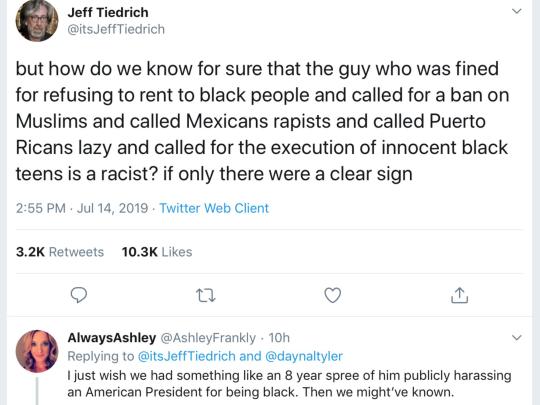
Trump is the biggest birther.
Melania is a fcuking birther!
Republicans knew exactly who they were voting for in 2016. After Obama, they wanted whiteness to be reprioritized by the biggest racist they could find.
516 notes
·
View notes
Text
1 note
·
View note
Photo
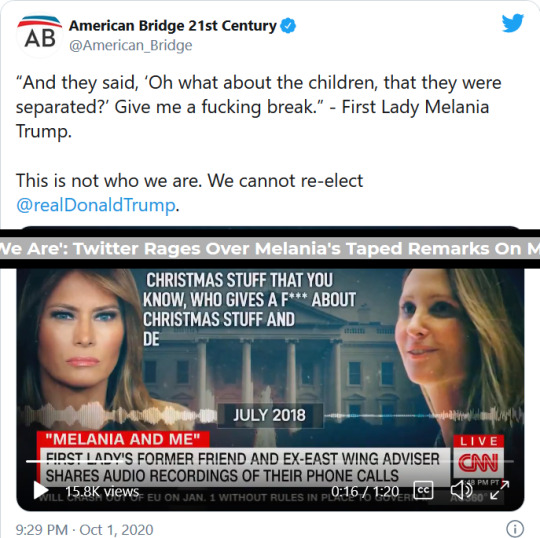



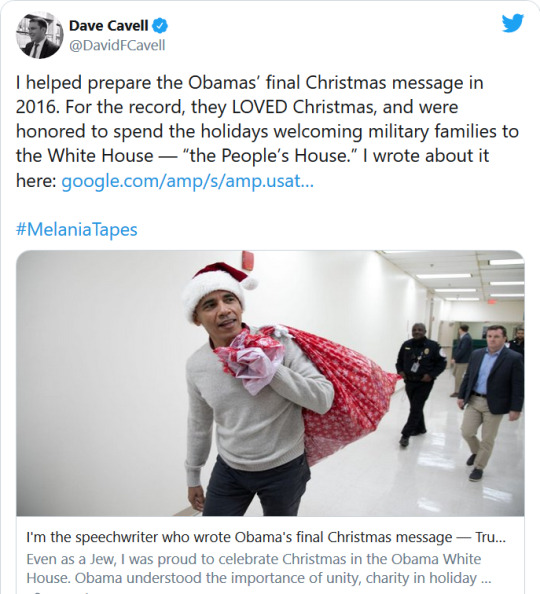



‘This Is Not Who We Are’: Twitter Rages Over Melania’s Taped Remarks On Migrant Children She also doesn’t care much for Christmas decorating:
“Welp. Melania Trump is apparently on the front lines in the War on Christmas.”
"When someone shows you who they are, believe them the first time." -- Maya Angelou
Twitter critics were slack-jawed Thursday after a secretly taped conversation with Melania Trump appeared to show the first lady being disdainful of media questions about migrant children separated from their families — and about White House Christmas decor.
The conversation from July 2018, which was aired Thursday on CNN, had reportedly occurred between her and former friend and aide Stephanie Winston Wolkoff. At one point, the first lady, who had recently visited a Texas shelter at the border, appeared irritated that she had been asked about children separated from their parents when she wanted to talk about how she was “working on Christmas planning.”
“They said, ‘Oh, what about the children that were separated?’ Give me a fucking break,” she said.
One critic on Twitter shot back: “You know who didn’t get a f**king break? The children.”
Melania Trump also is heard saying on the tape that many migrant children with families seeking asylum are “teached by other people what to say” to stay in the U.S.
The first lady is an immigrant from Slovenia.
She also griped about the pressure she had been under to come up with the White House displays for Christmas, the holiday her husband claims pagan leftists are killing: “Who gives a f**k about Christmas stuff and decoration?”
Rep. Ted Lieu (D-Calif.), who is Catholic, tweeted that he “resents” Trump and his family for mocking Christians and looking “down on our faith. We believe Christmas is the day Christ was born, and we are not ‘hustlers,’ as Trump has called us.”
Dave Cavell, who had been a speechwriter for former President Barack Obama, tweeted about how much the Obama family truly loved Christmas in the “People’s House.”
The American Bridge PAC tweeted: “This is not who we are. We cannot reelect Donald Trump.
A number of supporters of the first lady, however, professed they had never been prouder of her or admired her more.
Alida Garcia@leedsgarcia * While everyone is discussing the #MelaniaTapes I'd like to just remind you that family separation is alive and well and tonight a child will show up alone at the US Border and our country's policy is to deport that child without their parents or lawyers to help them.
Paul Rudnick@PaulRudnickNY Here's the thing about the Melania tapes, whichever side you're on: they're drowning in self-pity, and she acts like, thanks to Trump and the media, she never has a choice in how to behave. She always has a choice
Hey Evangelicals. That 'War on Christmas' you're always talking about... It's coming from inside the White House.
Can we stop the Melania is an innocent bystander storyline now? #MelaniaTapes
Are y’all really surprised a racist birther said something else terrible?
Melania: "Who gives a fuck about Christmas stuff?"
Also Melania: What about the children separated [in cages]? "Give me a fucking break."
Folks, this is the true Melania: She is a selfish, narcissistic, mean-spirited bitch who cares only for her personal riches.
#MelaniaTapes
https://www.huffpost.com/entry/melania-trump-kids-in-cages-christmas_n_5f76903ac5b66377b27fca5e
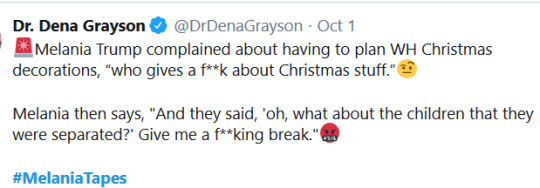
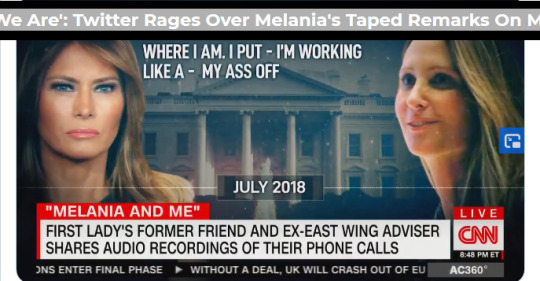
2 notes
·
View notes
Photo
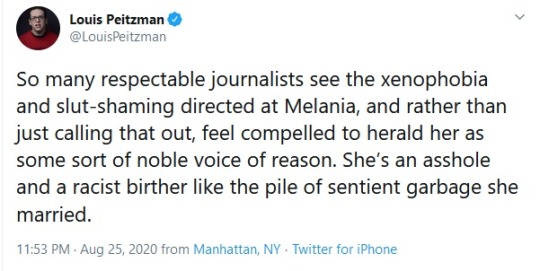
(via)
#Melania Trump#sexshaming#slutshaming#xenophobia#media bias#mlop#racism#birtherism#rnc#gop#gop convention 2020#rnc 2020#rnc2020
2 notes
·
View notes
Link
A racial realist IS a white supremacist!!!
By Greg Miller
In unguarded moments with senior aides, President Trump has maintained that Black Americans have mainly themselves to blame in their struggle for equality, hindered more by lack of initiative than societal impediments, according to current and former U.S. officials.
After phone calls with Jewish lawmakers, Trump has muttered that Jews “are only in it for themselves” and “stick together” in an ethnic allegiance that exceeds other loyalties, officials said.
Trump’s private musings about Hispanics match the vitriol he has displayed in public, and his antipathy to Africa is so ingrained that when first lady Melania Trump planned a 2018 trip to that continent he railed that he “could never understand why she would want to go there.”
When challenged on these views by subordinates, Trump has invariably responded with indignation. “He would say, ‘No one loves Black people more than me,’ ” a former senior White House official said. The protests rang hollow because if the president were truly guided by such sentiments he “wouldn’t need to say it,” the official said. “You let your actions speak.”
In Trump’s case, there is now a substantial record of his actions as president that have compounded the perceptions of racism created by his words.
Over 3½ years in office, he has presided over a sweeping U.S. government retreat from the front lines of civil rights, endangering decades of progress against voter suppression, housing discrimination and police misconduct.
His immigration policies hark back to quota systems of the 1920s that were influenced by the junk science of eugenics, and have involved enforcement practices — including the separation of small children from their families — that seemed designed to maximize trauma on Hispanic migrants.
With the election looming, the signaling behind even second-tier policy initiatives has been unambiguous.
After rolling back regulations designed to encourage affordable housing for minorities, Trump declared himself the champion of the “Suburban Lifestyle Dream.” He ordered aides to revamp racial sensitivity training at federal agencies so that it no longer refers to “White privilege.” In a speech at the National Archives on Thursday, Trump vowed to overhaul what children are taught in the nation’s schools — something only states have the power to do — while falsely claiming that students are being “fed lies about America being a wicked nation plagued by racism.”
The America envisioned by these policies and pronouncements is one dedicated to preserving a racial hierarchy that can be seen in Trump’s own Cabinet and White House, both overwhelmingly white and among the least diverse in recent U.S. history.
Trump’s push to amplify racism unnerves Republicans who have long enabled him
Scholars describe Trump’s record on race in historically harsh terms. Carol Anderson, a professor of African American Studies at Emory University, compared Trump to Andrew Johnson, who succeeded Abraham Lincoln as president and helped Southern Whites reestablish much of the racial hegemony they had seemingly lost in the Civil War.
“Johnson made it clear that he was really the president of a few people, not the American people,” Anderson said. “And Trump has done the same.”
A second White House official who worked closely with Trump quibbled with the comparison, but only because later Oval Office occupants also had intolerant views.
“Woodrow Wilson was outwardly a white supremacist,” the former official said. “I don’t think Trump is as bad as Wilson. But he might be.”
White House officials vigorously dispute such characterizations.
“Donald Trump’s record as a private citizen and as president has been one of fighting for inclusion and advocating for the equal treatment of all,” said Sarah Matthews, a White House spokeswoman. “Anyone who suggests otherwise is only seeking to sow division.”
No senior U.S. official interviewed could recall Trump uttering a racial or ethnic slur while in office. Nor did any consider him an adherent of white supremacy or white nationalism, extreme ideologies that generally sanction violence to protect White interests or establish a racially pure ethno-state.
White House officials also pointed to achievements that have benefited minorities, including job growth and prison-sentence reform.
But even those points fade under scrutiny. Black unemployment has surged disproportionately during the coronavirus pandemic, and officials said Trump regretted reducing prison sentences when it didn’t produce a spike in Black voter support.
And there are indications that even Trump’s allies are worried about his record on race. The Republican Party devoted much of its convention in August to persuading voters that Trump is not a racist, with far more Black speakers at the four-day event than have held top White House positions over the past four years.
This story is based on interviews with more than two dozen current and former officials, including some who have had daily interactions with the president, as well as experts on race and members of white supremacist groups. Many spoke on the condition of anonymity, citing a desire to provide candid accounts of events and conversations they witnessed without fear of retribution.
Coded racial terms
Most attributed Trump’s views on race and conduct to a combination of the prevailing attitudes of his privileged upbringing in the 1950s in what was then a predominantly White borough of New York, as well as a cynical awareness that coded racial terms and gestures can animate substantial portions of his political base.
The perspectives of those closest to the president are shaped by their own biases and self-interests. They have reason to resist the idea that they served a racist president. And they are, with few exceptions, themselves White males.
Others have offered less charitable assessments.
Omarosa Manigault Newman, one of the few Black women to have worked at the White House, said in her 2018 memoir that she was enlisted by White House aides to track down a rumored recording from “The Apprentice” — the reality show on which she was a contestant — in which Trump allegedly used the n-word. A former official said that others involved in the effort included Trump adviser Hope Hicks and former White House spokeswoman Sarah Sanders.
The tape, if it exists, was never recovered. But Manigault Newman, who was forced out after clashing with other White House staff, portrayed the effort to secure the tape as evidence that aides saw Trump capable of such conduct. In the book, she described Trump as “a racist, misogynist and bigot.”
Mary L. Trump, the president’s niece, has said that casual racism was prevalent in the Trump family. In interviews to promote her recently published book, she has said that she witnessed her uncle using both anti-Semitic slurs as well as the n-word, though she offered few details and no evidence.
Michael Cohen, the president’s former lawyer, has made similar allegations and calls Trump “a racist, a predator, a con man” in a newly published book. Cohen accuses Trump of routinely disparaging people of color, including former president Barack Obama. “Tell me one country run by a Black person that isn’t a s---hole,” Trump said, according to Cohen.
These authors did not provide direct evidence of Trump’s racist outbursts, but the animus they describe aligns with the prejudice Trump so frequently displays in public.
In recent months, Trump has condemned Black Lives Matter as a “symbol of hate” while defending armed White militants who entered the Michigan Capitol, right-wing activists who waved weapons from pickup trucks in Portland and a White teen who shot and killed two protesters in Wisconsin.
Trump has vowed to safeguard the legacies of Confederate generals while skipping the funeral of the late congressman John Lewis (D-Ga.), a civil rights icon, and retweeted — then deleted — video of a supporter shouting “White power” while questioning the electoral eligibility of Sen. Kamala D. Harris (D-Calif.), the nation’s first Black and Asian American candidate for vice president from a major party. In so doing, Trump reanimated a version of the false “birther” claim he had used to suggest that Obama may not have been born in the United States.
These add to an already voluminous record of incendiary statements, including his tweet that minority congresswomen should “go back” to their “crime infested” countries despite being U.S.-born or U.S. citizens, and his claim that there were “very fine people on both sides” after torch-carrying white nationalists staged a violent protest in Charlottesville.
In a measure of Trump’s standing with such organizations, the Stormfront website — the oldest and largest neo-Nazi platform on the Internet — recently issued a call to its followers to mobilize.
“If Trump doesn’t win this election, the police will be abolished and Blacks will come to your house and kill you and your family,” the site warned. “This isn’t about politics anymore, it is about basic survival.”
As the election approaches, Trump has also employed apocalyptic language. He recently claimed that if Democratic nominee Joe Biden is elected, police departments will be dismantled, the American way of life will be “abolished” and “no one will be SAFE.”
Given the country’s anguished history, it is hard to isolate Trump’s impact on the racial climate in the United States. But his first term has coincided with the most intense period of racial upheaval in a generation. And the country is now in the final stretch of a presidential campaign that is more explicitly focused on race — including whether the sitting president is a racist — than any election in modern American history.
Biden has seized on the issue from the outset. In a video declaring his candidacy, he used images from the clashes in Charlottesville, and said he felt compelled to run because of Trump’s response. He has called Trump the nation’s first racist president and pledged to use his presidency to heal divisions that are a legacy of the country’s “original sin” of slavery.
Exploiting societal divisions
Trump has confronted allegations of racism in nearly every decade of his adult life. In the 1970s, the Trump family real estate empire was forced to settle a Justice Department lawsuit alleging systemic discrimination against Black apartment applicants. In the 1980s, he took out full-page ads calling for the death penalty against Black teens wrongly accused of a rape in Central Park. In the 2000s, Trump parlayed his baseless “birther” claim about Obama into a fervent far-right following.
As president, he has cast his record on race in grandiose terms. “I’ve done more for Black Americans than anybody with the possible exception of Abraham Lincoln,” Trump said July 22, a refrain he has repeated at least five times in recent months.
None of the administration officials interviewed for this story agreed with Trump’s self-appraisals. But several sought to rationalize his behavior.
Some argued that Trump only exploits societal divisions when he believes it is to his political advantage. They pointed to his denunciations of kneeling NFL players and paeans to the Confederate flag, claiming these symbols matter little to him beyond their ability to rouse supporters.
“I don’t think Donald Trump is in any way a white supremacist, a neo-Nazi or anything of the sort,” a third former senior administration official said. “But I think he has a general awareness that one component of his base includes factions that trend in that direction.”
Studies of the 2016 election have shown that racial resentment was a far bigger factor in propelling Trump to victory than economic grievance. Political scientists at Tufts University and the University of Massachusetts, for example, examined the election results and found that voters who scored highly on indexes of racism voted overwhelmingly for Trump, a dynamic particularly strong among non-college-educated Whites.
Several current and former administration officials, somewhat paradoxically, cited Trump’s nonracial biases and perceived limitations as exculpatory.
Several officials said that Trump is not a disciplined enough thinker to grasp the full dimensions of the white nationalist agenda, let alone embrace it. Others pointed out that they have observed him making far more offensive comments about women, insisting that his scorn is all-encompassing and therefore shouldn’t be construed as racist.
“This is a guy who abuses people in his cabinet, abuses four-star generals, abuses people who gave their life for this country, abuses civil servants,” the first former senior White House official said. “It’s not like he doesn’t abuse people that are White as well.”
Nearly all said that Trump places far greater value on others’ wealth, fame or loyalty to him than he does on race or ethnicity. In so doing, many raised a version of the “some of my best friends are Black” defense on behalf of the president.
When faced with allegations of racism in the 2016 campaign, Trump touted his friendship with boxing promoter Don King to argue otherwise. Administration officials similarly pointed to the president’s connection to Black people who have praised him, worked for him or benefited from his help.
They cited Trump’s admiration for Tiger Woods and other Black athletes, the political support he has received from Sen. Tim Scott (R-S.C.) and other Black lawmakers, the president’s fondness for Ja’Ron Smith, who as assistant to the president for domestic policy is the highest-ranking Black staffer at the White House, and his pardon of Black criminal-justice-reform advocate Alice Marie Johnson, expunging her 1996 conviction for cocaine trafficking.
In his speech at the Republican National Convention, Scott used his personal story of bootstrap success to emphasize the ways that Republican policies on taxes, school choice and other issues create opportunities for minorities.
Trump “has fought alongside me” on such issues, Scott said, urging voters “not to look simply at what the candidates say, but to look back at what they’ve done.”
For all the prominence that Scott and other Black Trump supporters were given at the convention, there has been no corresponding representation within the Trump administration.
The official photo stream of Trump’s presidency is a slide show of a commander in chief surrounded by White faces, whether meeting with Cabinet members or posing with the latest intern crop.
From the outset, his leadership team has been overwhelmingly White. A Washington Post tally identified 59 people who have held Cabinet positions or served in top White House jobs including chief of staff, press secretary and national security adviser since Trump took office.
Only seven have been people of color, including Defense Secretary Mark T. Esper and Health and Human Services Secretary Alex Azar, who are of Lebanese heritage. Only one — Ben Carson, the Secretary of Housing and Urban Development — is Black.
Under Trump, the nation’s federal courts have also become increasingly White. Of the 248 judges confirmed or nominated since Trump took office, only eight were Black and eight were Hispanic, according to records compiled by NPR News.
Retreating from civil rights
Trump can point to policy initiatives that have benefited Black or other minority groups, including criminal justice reforms that reduced prison sentences for thousands of Black men convicted of nonviolent, drug-related crimes.
About 4,700 inmates have been released or had their sentences reduced under the First Step Act, an attempt to reverse the lopsided legacy of the drug wars of the 1980s and 1990s, which disproportionately targeted African Americans. But this policy was championed primarily by Jared Kushner, Trump’s son-in-law, and former officials said that Trump only agreed to support the measure when told it might boost his low poll numbers with Black voters.
Months later, when that failed to materialize, Trump “went s---house crazy,” one former official said, yelling at aides, “Why the hell did I do that?”
Manigault Newman was similarly excoriated when her efforts to boost funding for historically Black colleges failed to deliver better polling numbers for the president, officials said. “You’ve been at this for four months, Omarosa,” Trump said, according to one adviser, “but the numbers haven’t budged.” Manigault Newman did not respond to a request for comment.
White House officials cited other initiatives aimed at helping people of color, including loan programs targeting minority businesses and the creation of “opportunity zones” in economically distressed communities.
Trump has pointed most emphatically to historically low Black unemployment rates during his first term, arguing that data show they have fared better under his administration than under Obama or any other president.
But unemployment statistics are largely driven by broader economic trends, and the early gains of Black workers have been wiped out by the pandemic. Blacks have lost jobs at higher rates than other groups since the economy began to shut down. The jobless rate for Blacks in August was 13 percent, compared with 7.3 percent for Whites — the highest racial disparity in nearly six years.
Neither prison reform nor minority jobs programs were priorities of Trump’s first term. His administration has devoted far more energy and political capital to erecting barriers to non-White immigrants, dismantling the health-care policies of Obama and pulling federal agencies back from civil rights battlegrounds.
Under Trump, the Justice Department has cut funding in its Civil Rights Division, scaled back prosecutions of hate crimes, all but abandoned efforts to combat systemic discrimination by police departments and backed state measures that deprived minorities of the right to vote.
Weeks after Trump took office, the department announced it was abandoning its six-year involvement in a legal battle with Texas over a 2011 voter ID law that a federal court had ruled unfairly targeted minorities.
Later, the department went from opposing, under Obama, an Ohio law that allowed the state to purge tens of thousands of voters from its rolls to defending the measure before the Supreme Court.
The law was upheld by the court’s conservative majority. In a dissenting opinion, Supreme Court Justice Sonia Sotomayor noted that voter rolls in African American neighborhoods shrank by 10 percent, compared with 4 percent in majority-White suburbs.
The Justice Department’s shift when faced with allegations of systemic racism by police departments has been even more stark.
After the Rodney King beating in Los Angeles in 1991, Congress gave the department new power to investigate law enforcement agencies suspected of engaging in a “pattern or practice” of systemic — including racist — misconduct. The probes frequently led to settlements that required sweeping reforms.
The authority was put to repeated use by three consecutive presidents: 25 times under Bill Clinton, 21 under George W. Bush and 25 under Obama. Under Trump, there has been only one.
The collapse has coincided with a surge in police killings captured on video, the largest civil rights protests in decades and polling data that suggests a profound turn in public opinion in support of the Black Lives Matter cause — though that support has waned in recent weeks as protests became violent in some cities.
A Justice Department spokesman pointed to nearly a dozen cases over the past three years in which the department has prosecuted hate crimes or launched racial discrimination lawsuits. In perhaps the most notable case, James Fields Jr., who was convicted of murder for driving his car into a crowd of protesters in Charlottesville, also pleaded guilty to federal hate crime charges.
“The Civil Rights Division of the United States Department of Justice is vigorously fighting race discrimination throughout the United States. Any assertion to the contrary is completely false,” said Assistant Attorney General Eric Dreiband. “Since 2017, we have prosecuted criminal and civil race discrimination cases in all parts of the United States, and we will continue to do so.”
But the department has not launched a pattern or practice probe into any of the police departments involved in the killings that ignited this summer’s protests, including the May 25 death in Minneapolis of George Floyd, who asphyxiated after a White policeman kept him pinned to the ground for nearly eight minutes with a knee to his neck.
The department has opened a more narrow investigation of the officers directly involved in Floyd’s death. Attorney General William P. Barr called Floyd’s killing “shocking,” but in congressional testimony argued there was no reason to commit to a broader probe of Minneapolis or any other police force.
“I don’t believe there is systemic racism in police departments,” Barr said.
Deport, deny and discourage
Days after the 2016 election, David Duke, a longtime leader of the Ku Klux Klan, tweeted that Trump’s win was “great for our people.” Richard Spencer, another prominent white nationalist figure, was captured on video leading a “Hail Trump” salute at an alt-right conference in Washington.
People with far-right views or white nationalist sympathies gravitated to the administration.
Michael Anton, who published a 2016 essay comparing the country’s course under Obama to that of an aircraft controlled by Islamist terrorists and called for an end to “the ceaseless importation of Third World foreigners,” became deputy national security adviser for strategic communication.
Ian Smith served as an immigration policy analyst at the Department of Homeland Security until email records showed connections with Spencer and other white supremacists. Darren Beattie worked as a White House speechwriter before leaving abruptly when CNN reported his involvement in a conference frequented by white nationalists.
Stephen K. Bannon, who for years used Breitbart News to advance an alt-right, anti-immigrant agenda, was named White House chief strategist, only to be banished eight months later after clashing with other administration officials.
Stephen Miller, by contrast, has survived a series of White House purges and used his position as senior adviser to the president to push hard-line policies that aim to deport, deny and discourage non-European immigrants.
While working for the Trump campaign in 2016, Miller sent a steady stream of story ideas to Breitbart drawn from white nationalist websites, according to email records obtained by the Southern Poverty Law Center. In one exchange, Miller urged a Breitbart reporter to read “Camp of the Saints,” a French novel that depicts the destruction of Western civilization by rampant immigration. The book has become a touchpoint for white supremacist groups.
Miller was the principal architect of, and driving force behind, the so-called Muslim Ban issued in the early days of Trump’s presidency and the separation of migrant children from their parents along the border with Mexico. He has also worked behind the scenes to turn public opinion against immigrants and outmaneuver bureaucratic adversaries, officials said.
To blunt allegations of racism and xenophobia in the administration’s policies, Miller has sought to portray them as advantageous to people of color. In several instances, Miller directed subordinates to “look for Latinos or Blacks who have been victims of a crime by an immigrant,” then pressured officials at the Department of Homeland Security to tout these cases to the press, one official said. Families of some victims appeared as prominent guests of the president at the State of the Union address.
In 2018, as Miller sought to slash the number of refugees admitted to the United States, Pentagon officials argued that the existing policy was crucial to their ability to relocate interpreters and other foreign nationals who risked their lives to work with U.S. forces in Iraq and Afghanistan.
“What do you want? Iraqi communities across the United States?” Miller erupted during one meeting of National Security Council deputies, according to witnesses. The refugee limit has plunged since Trump took office, from 85,000 in 2016 to 18,000 this year.
In response to a request for comment from Miller, Matthews, the White House spokeswoman, said that “this attempt to vilify Stephen Miller with egregious and unfounded allegations from anonymous sources is shameful and completely unethical.”
As a descendant of Jewish immigrants, Miller is regarded warily by white supremacist organizations even as they applaud some of his actions.
“Our side doesn’t consider him one of us — for obvious reasons,” said Don Black, the founder of the Stormfront website, in an interview. “He’s kind of an odd choice to be the white nationalist in the White House.”
Trump’s presidency has corresponded with a surge in activity by white nationalist groups, as well as concern about the growing danger they pose.
Recent assessments by the Department of Homeland Security describe white supremacists as the country’s gravest domestic threat, exceeding that of the Islamic State and other terror groups, according to documents obtained by the Lawfare national security website and reported by Politico.
The FBI has expanded resources to tracking hate groups and crimes. FBI Director Christopher A. Wray testified Thursday that “racially motivated violent extremism” accounts for the bulk of the bureau’s domestic terrorism cases, and that most of those are driven by white supremacist ideology.
Major rallies staged by white nationalist organizations, which were already on the upswing just before the 2016 election, increased in size and frequency after Trump took office, according to Brian Levin, an expert on hate groups at California State University at San Bernardino.
The largest, and most ominous, was the “Unite the Right” rally in Charlottesville.
On Aug. 11, 2017, hundreds of white supremacists, neo-fascists and Confederate sympathizers descended on the city. Purportedly there to protest the planned removal of a Robert E. Lee statue, they carried torches and chanted slogans including “blood and soil” and “you will not replace us” laden with Klan and Nazi symbolism.
The event erupted in violence the next day, Saturday, when Fields, a self-proclaimed white supremacist, drove his car into a crowd of counterprotesters, tossing bodies into the air. Heather Heyer, a 32-year-old Virginia native and peace activist, was killed.
Trump’s vacillating response in the ensuing days came to mark one of the defining sequences of his presidency.
Speaking from his golf resort in Bedminster, N.J., Trump at first stuck to a calibrated script: “We condemn in the strongest possible terms this egregious display of hatred, bigotry and violence.” Then, improvising, he added: “on many sides, on many sides.”
In six words, Trump had drawn a moral equivalency between the racist ideology of those responsible for the Klan-like spectacle and the competing beliefs that compelled Heyer and others to confront hate.
Trump’s comments set off what some in the White House came to regard as a behind-the-scenes struggle for the moral character of his presidency.
John F. Kelly, a retired Marine Corps general who was just weeks into his job as White House chief of staff, confronted Trump in the corridors of the Bedminster club. “You have to fix this,” Kelly said, according to officials familiar with the exchange. “You were supporting white supremacists. You have to go back out and correct this.”
Gary Cohn, the White House economic adviser at the time, threatened to resign and argued that there were no “good people” among the ranks of those wearing swastikas and chanting “Jews will not replace us.” In a heated exchange, Cohn criticized Trump for his “many sides” comment, and was flummoxed when Trump denied that was what he had said.
“Not only did you say it, you continued to double down on it,” Cohn shot back, according to officials familiar with the exchange. “And if you want, I’ll get the transcripts.”
Trump relented that Monday and delivered the ringing condemnation of racism that Kelly, Cohn and others had urged. “Racism is evil,” he said, “and those who cause violence in its name are criminals and thugs, including the KKK, neo-Nazis, white supremacists, and other hate groups”
Aides were briefly elated. But Trump grew agitated by news coverage depicting his speech as an attempt to correct his initial blunder.
The next day, during an event at Trump Tower that was supposed to highlight infrastructure initiatives, Trump launched into a fiery monologue.
“You had a group on one side that was bad,” he said. “You had a group on the other side that was also very violent. Nobody wants to say that. I’ll say it right now.” By the end, the president appeared to be sanctioning racial divisions far beyond Charlottesville, saying “there are two sides to the country.”
For all their consternation, none of Trump’s top aides resigned over Charlottesville. Kelly remained in his job through 2018. Cohn stayed until March 2018 after being asked to lead the administration’s tax-reform initiative and reassured that he could share his own views about Charlottesville in public without retaliation from the president.
Kelly and Cohn declined to comment.
The most senior former administration official to comment publicly on Trump’s conduct on issues of race is former defense secretary Jim Mattis. After Trump responded to Black Lives Matter protests in Washington this summer with paramilitary force, Mattis responded with a blistering statement.
“Donald Trump is the first president in my lifetime who does not try to unite the American people — does not even pretend to try,” Mattis said. “Instead, he tries to divide us.”
In some ways, Charlottesville represented a high-water mark for white nationalism in Trump’s presidency. Civil rights groups were able to use footage of the mayhem in Virginia to identify members of hate groups and expose them to their employers, universities and families.
“Charlottesville backfired,” Levin said. Many of those who took part, especially the alt-right leadership, “were doxed, sued and beaten back,” he said, using a term for using documents available from public records to expose individuals.
“When the door to the big political tent closed on these overtly white nationalist groups, many collapsed, leaving a decentralized constituency of loose radicals now reorganizing under new banners,” Levin said.
Some white nationalist leaders have begun to express disenchantment with Trump because he has failed to deliver on campaign promises they hoped would bring immigration to a standstill or perhaps even ignite a race war.
“A lot of our people were expecting him to actually secure the borders, build the wall and make Mexico pay for it,” Black said.
“Some in my circles want to see him defeated,” Black said, because they believe a Biden presidency would call less attention to the white nationalist movement than Trump has, while fostering discontent among White people.
But Black sees those views as dangerously shortsighted, failing to appreciate the extraordinary advantages of having a president who so regularly aligns himself with aspects of the movement’s agenda.
“Symbolically, he’s still very important,” Black said of Trump. “I don’t think he considers himself a white supremacist or a white nationalist. But I think he may be a racial realist. He knows there are racial differences.”
1 note
·
View note
Photo
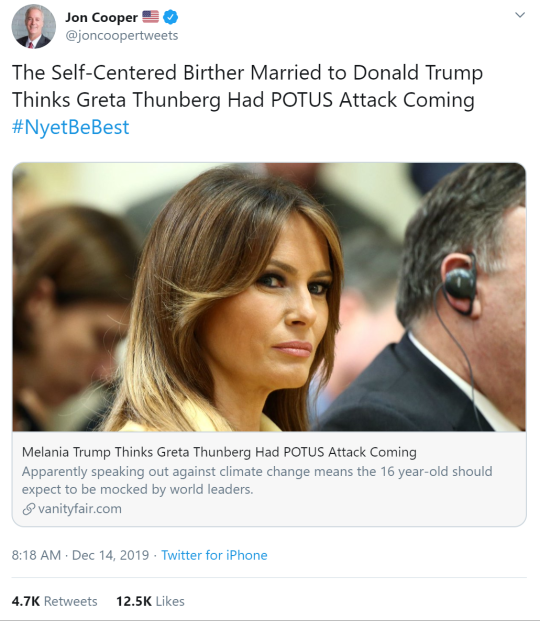
The Self-Centered Birther Married to Donald Trump Thinks Greta Thunberg Had POTUS Attack Coming #NyetBeBest
— Jon Cooper @joncoopertweets
I stand with Greta ✊
Melania is just like Trump and his other Kids #TRASH
Melania Trump Thinks Greta Thunberg Had POTUS Attack Coming, Vanity Fair
Donald Trump Describes Barron, His Very Own Son, As 'Melania's Son', Esquire
Future Watch: Barron bullied — had it coming
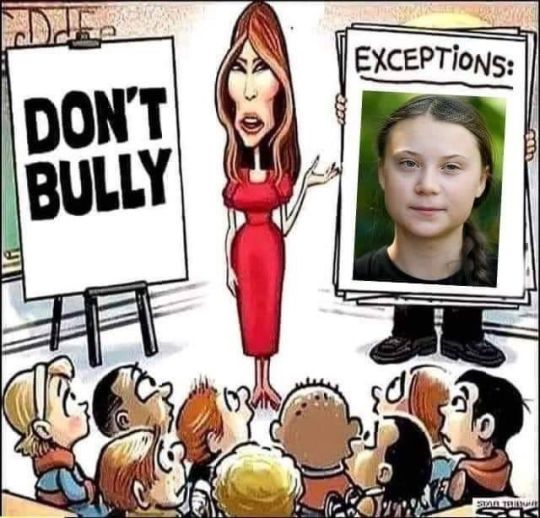
2 notes
·
View notes